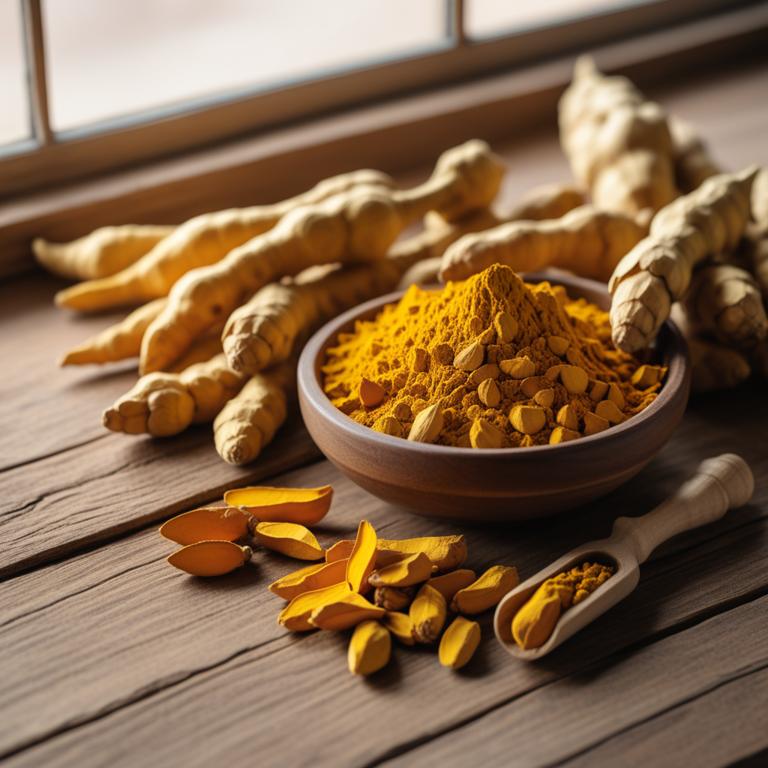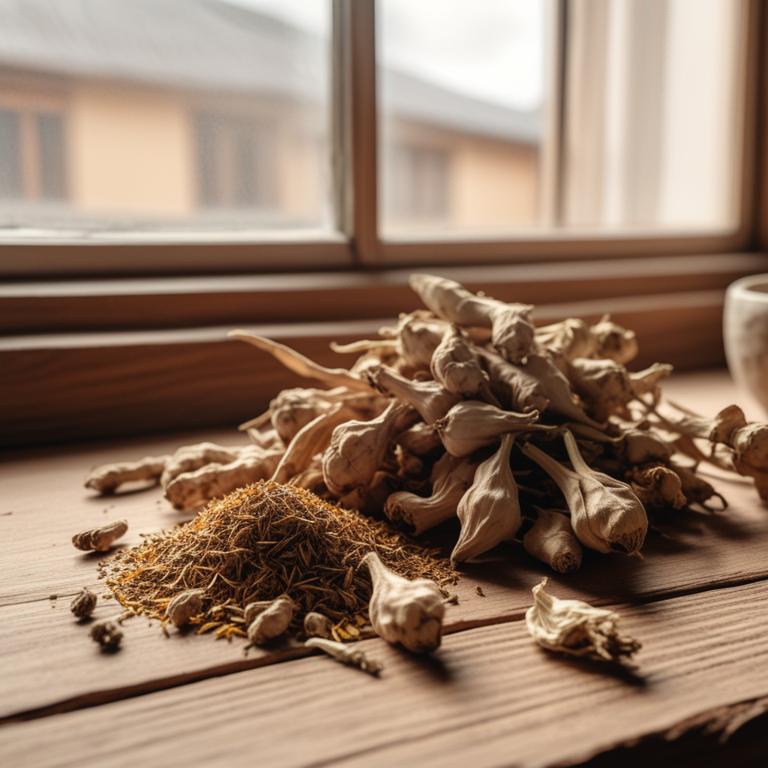Updated: Dec 1, 2024
Nausea and Its Causes: Herbal Remedies, Medicinal Treatments, and Natural Cures

Nausea is a feeling of discomfort and queasiness in the stomach that can make everyday life a challenge.
It can be triggered by motion sickness, food poisoning, stress, or even a bad cold. When you're experiencing nausea, you might feel like staying in bed and avoiding food altogether. The causes of nausea can be diverse, but often it's related to what you eat, or what's going on in your body. Motion sickness is a common issue for people who travel by car or boat. Food poisoning can happen when you eat something spoiled or contaminated. Stress and anxiety can also trigger nausea, especially during pregnancy or menstruation.
Fortunately, there are some healing herbs that can help alleviate nausea. Ginger is a popular choice for its anti-inflammatory properties and its ability to calm the stomach. Peppermint is another herb that can ease digestion and reduce nausea. Chamomile is a natural relaxant that can help calm your mind and body, reducing stress-related nausea. To use these herbs, you can try drinking teas made from dried ginger, peppermint, or chamomile leaves. You can also take ginger or peppermint in capsule form, or enjoy peppermint as a refreshing drink. Some people also find relief by applying peppermint oil to their wrists or temples.
Experimenting with these herbal remedies can help you find what works best for you.
Table of Contents
What causes nausea to occur?
The main causes of nausea are usually related to the body's response to internal or external stimuli.
One of the most common causes is Motion Sickness, which occurs when the body receives conflicting signals from the senses during travel, such as when looking at a moving scene while feeling the motion. This can cause the brain to become confused and trigger the vomiting center in the brain. Another cause of nausea is Pregnancy, particularly in the first trimester. Hormonal changes, especially the increase in estrogen levels, can affect the digestive system and lead to morning sickness. This is not a result of the pregnancy itself but rather the body's reaction to the hormonal changes. Food Poisoning is a common cause of nausea, usually caused by the presence of toxins or bacteria in food.
When these toxins enter the body, they can cause inflammation in the digestive system and trigger nausea and vomiting. Migraine is another possible cause of nausea, often accompanied by intense headaches. Some people experience nausea before a migraine, while others experience it during or after the migraine. The exact cause of migraine is not fully understood, but it is believed to be related to changes in blood flow and the release of certain chemicals in the brain. Morning Sickness, often associated with pregnancy, is a condition that affects many people, even those who are not pregnant. It is thought to be triggered by hormonal changes or sensitivity to smells and tastes.
Some people experience nausea in the morning, while others experience it at any time of day.
What advantages are associated with using herbs for nausea?
Using herbs for nausea can be very helpful.
They can calm your stomach and stop the feeling of queasiness. These herbs can also help you to feel more relaxed and less anxious, which can make nausea worse. Some herbs can help to reduce inflammation in your stomach, which can also cause nausea.
They can also help to regulate your digestive system and prevent stomach upset. This can be especially helpful for people who are pregnant, traveling, or experiencing chemotherapy. By using these herbs, you may be able to control nausea and feel better sooner.
They are often easy to use, either as teas, capsules, or tinctures, and can be a natural alternative to medication.
What are the main medicinal herbs that help to reduce nausea?

Herbs have been used for centuries to help with nausea, and for good reason.
One of the most effective is ginger (Zingiber officinale), which has natural anti-inflammatory properties that help calm the stomach and reduce queasiness. Peppermint (Mentha x piperita) is another popular choice, as its cooling effect can help soothe an upset stomach and relax muscles that are causing nausea.
Ginkgo biloba may seem like an unusual choice, but its ability to improve blood flow and reduce inflammation can help alleviate nausea caused by poor circulation or digestive issues. Fennel (Foeniculum vulgare) is a natural digestive aid that can help ease stomach cramps and spasms that can lead to nausea. And licorice root (Glycyrrhiza glabra) has been shown to have anti-inflammatory properties that can help reduce inflammation in the stomach and alleviate nausea.
These herbs can be consumed as teas, added to food, or taken in supplement form, making them a convenient and natural way to help manage nausea.
What are the most effective herbal treatments for nausea?

Herbal preparations can be very helpful when you're feeling queasy or nauseous.
There are several types of preparations that are particularly good for nausea. One of them is tea, which is made by steeping herbs in hot water. Peppermint tea, for example, is often recommended because peppermint has natural soothing properties that can calm your stomach and reduce nausea. Another type of preparation is a decoction, which is made by boiling herbs in water. Ginger decoction is a popular remedy for nausea because ginger has anti-inflammatory properties that can help to settle your stomach and make you feel better. An infusion is similar to tea, but it's made by steeping herbs in cold water or a combination of hot and cold water.
Chamomile infusion is often used to calm the stomach and promote relaxation, which can help to reduce nausea. A tincture is a liquid herbal preparation that's made by soaking herbs in a solvent like alcohol or glycerin. Tinctures are often used to treat nausea because they can be easily absorbed into the bloodstream and provide quick relief from symptoms. Lastly, there are herbal capsules that contain dried herbs that have been processed into a powder. These capsules can be taken orally and are often used to treat nausea because they provide a concentrated dose of the herb's active ingredients. These herbal preparations can be very effective in reducing nausea because they're often made from natural ingredients that have anti-inflammatory and soothing properties.
They can help to calm your stomach, reduce inflammation, and promote relaxation, all of which can help to alleviate nausea.
Additional Resources:
What herbs are best avoided when experiencing nausea?
If you have nausea, it's best to steer clear of some herbs that can make it worse.
Aristolochia clematitis, for instance, can cause stomach problems and even lead to kidney damage. This herb is not safe to use when you're already feeling queasy. Taxus baccata, also known as yew, contains a toxic compound that can cause nausea and vomiting, among other symptoms.
Rauvolfia serpentina, a plant used to treat high blood pressure, can also cause stomach upset and nausea. Cinchona officinalis, the source of quinine, can trigger nausea and stomach pain, especially if taken in large doses. Berberis vulgaris, commonly used to treat digestive issues, can cause nausea and stomach cramps in some people.
When you're already feeling unwell, it's better to avoid these herbs altogether and opt for gentler alternatives that won't exacerbate your nausea.
FAQ
Are there any specific herbs that can prevent nausea?
Ginger is known to help prevent nausea.
It's often used in teas, soups, and even candies. Peppermint oil can also have a calming effect on the stomach. Some people find that chamomile, a natural relaxant, helps reduce nausea.
These herbs can be consumed in various forms, such as teas or capsules, to help alleviate nausea.
Is it safe to use herbal remedies for nausea during pregnancy?
Using herbal remedies for nausea during pregnancy can be tricky.
Some herbs, like ginger, are often used to ease nausea, but others might not be safe for the baby. If you're considering herbal remedies, make sure to research the specific herb and its potential effects on pregnancy.
Some herbs might even be toxic.
Are there any herbs that can reduce the frequency of nausea?
Ginger is a well-known herb that can help reduce nausea.
It's often used to calm upset stomachs and alleviate queasiness. Many people find that consuming ginger in the form of tea, capsules, or even ginger ale helps to ease nausea.
Some studies suggest that it can be especially helpful when dealing with motion sickness.
Can i combine different herbal remedies for nausea?
You can combine different herbal remedies for nausea, but be cautious.
Ginger and peppermint together might help, as they both have calming effects on the stomach. However, some herbs can interact with each other or your medications.
Start with small amounts and see how your body reacts before increasing the dose or adding more remedies.
Related Articles

Speech Difficulty: Harnessing the Power of Medicinal Herbs and Herbal Preparations

Overcoming Numbness in Hands with Medicinal Herbs and Herbal Preparations

Understanding Headaches: Causes, Herbal Remedies, and Natural Preparations

Understanding Fatigue: Causes, Medicinal Herbs, and Herbal Remedies

Migraine: Understanding the Causes and Herbal Remedies






